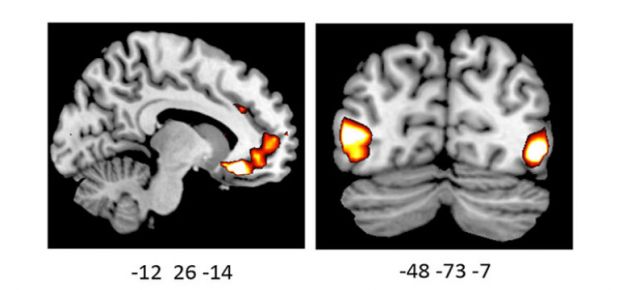Genetics
How Do Your Genes Influence Levels of Emotional Sensitivity?
A specific gene variation can make your brain more emotionally sensitive.
Posted May 9, 2015

Carl Jung would describe a highly sensitive person (HSP) as someone who has high sensory processing and an “innate sensitiveness.” About 20 percent of the population is believed to be highly sensitive. Would you consider yourself to be a highly sensitive person?
In general, people who are characterized as “HSPs” show heightened awareness to subtle stimuli, process environmental information more thoroughly, and have more vivid perceptions of both positive and negative stimuli.
Recently, neuroscientists from the University of British Columbia (UBC) and Cornell University discovered that your genes may influence how sensitive you are to emotional information.
The researchers identified that some of us carry a certain genetic variation called ADRA2b. This gene variation influences the neurotransmitter norepinephrine. ADRA2b is linked to heightened activity in specific brain regions that trigger more intense emotional responses and sensitivity when viewing both positive and negative images.
The May 2015 study, "Neurogenetic Variations in Norepinephrine Availability Enhance Perceptual Vividness,” was published in the Journal of Neuroscience. For this study, participants were asked to estimate the amount of "noise", or pixelation, applied to images that had either positive, negative, or neutral emotional content

Carriers of the ADRA2b gene variation show more activity in a region of the brain responsible for regulating emotions and evaluating both pleasure and threat. In a press release, lead author Rebecca Todd described the study saying,
People really do see the world differently. For people with this gene variation, the emotionally relevant things in the world stand out much more. We thought, from our previous research, that people with the deletion variant would probably show this emotionally enhanced vividness, and they did more than we would even have predicted.
People who have the deletion variant are drawing on an additional network in their brains important for calculating the emotional relevance of things in the world. In any situation where noticing what's relevant in the environment is important, this gene variation would be a positive.
Adam Anderson, professor of human development at Cornell University and senior author of the study added, “Emotions are not only about how feel about the world, but how our brains influence our perception of it. As our genes influence how we literally see the positive and negative aspects of our world more clearly, we may come to believe the world has more rewards or threats."
The Quality of Strength Lined with Tenderness Is Unbeatable
Unfortunately, for many HSPs, their sensitivity to the environment makes them more prone to post-traumatic stress disorder (PTSD). Personally, I've always identified more as a hyper-sensitive "orchid" than an emotionally teflon-coated "dandelion." Ideally, mastering the ability to be sensitive and resilient simultaneously allows someone to experience emotions from the past and present without becoming overwhelmed.
Maya Angelou said famously, "The quality of strength lined with tenderness is an unbeatable combination." As a young gay teen, my sensitivity made me so vulnerable to the hateful environs of a homophobic world that I almost imploded. Luckily, I discovered distance running when I was 17 and it turned my life around.
As a runner, I lived by the advice of Maya Angelou and strived to remain tender and strong at the same time. This combination became a part of my winning formula. My ability to remain both hypersensitive and resilient as an athlete allowed me tap into the vividness of my surroundings while running, biking, and swimming long distances. All of my senses automatically tapped into the environment around me whenever I was competing. Nature became like a Source of rocket fuel that got into my cells and propelled me to the finish line of each and every ultra-endurance event.
Is Being a Highly Sensitive Person (HSP) In Your Genes?
The recent findings by Anderson and Todd are supported by previous research. A 2014 study led by researches at Stony Brook University used functional Magnetic Resonance Imaging (fMRI) to validate that highly sensitive people are more finely "tuned-in" to their environment.
The collaboration between Stony Brook University psychologists Arthur and Elaine Aron and colleagues at the University of California, Albert Einstein College of Medicine, and Monmouth University provides the first fMRI evidence that the "highly sensitive" brain responds more intensely to emotional images.
The 2014 study, "The Highly Sensitive Brain: An fMRI study of Sensory Processing Sensitivity and Response to Others' Emotions,” was published in the journal Brain and Behavior.
According to Dr. Arthur Aron, the HSP trait is strongly associated with identifiable behaviors, genes, physiological reactions, and patterns of brain activation. Elaine Aron, PhD, is credited as being the originator of HSP terminology.
For his study, the researchers used fMRI brain scans to compare HSPs with lower sensitivity people called "SPS" individuals. This brain imaging research is the first to use fMRI to demonstrate how HSPs' brain activity processes another perons's emotions by viewing photos of emotionally expressive faces. In a press release Dr. Aron said,
We found that areas of the brain involved with awareness and emotion, particularly those areas connected with empathetic feelings, in the highly sensitive people showed substantially greater blood flow to relevant brain areas than was seen in individuals with low sensitivity during the twelve second period when they viewed the photos. This is physical evidence within the brain that highly sensitive individuals respond especially strongly to social situations that trigger emotions, in this case of faces being happy or sad.
The brain activity was even higher when HSPs viewed the facial expressions of their spouses. The highest activation occurred when viewing images of their partner as being happy. Most of the participants were scanned again one year later, and the same results occurred.
The brain areas that showed the greatest activity in this study include sections known as the "mirror neuron system," an area linked to empathetic response and brain areas associated with awareness, processing sensory information, and action planning.
Conclusion: Understanding the science of HSP Could Help People with PTSD
Being able to identify genetic markers for highly sensitive people could help create more effective treatments for people suffering from post-traumatic stress disorder.
If you'd like to read more on this topic, check out my Psychology Today blog posts:
- "Do "Mirror Neurons" Help Create Social Understanding?"
- "Neuroscientists Confirm That Our Loved Ones Become Ourselves"
- "Neuroscientists Confrim That Strangers Can Become Ourselves"
- "How Do Genes Sway the Sensitivity of Resilience of a Child?"
- "Optogenetics Allow Neuroscientists to Turn Fear Off and On"
© 2015 Christopher Bergland. All rights reserved.
Follow me on Twitter @ckbergland for updates on The Athlete’s Way blog posts.
The Athlete’s Way ® is a registered trademark of Christopher Bergland




